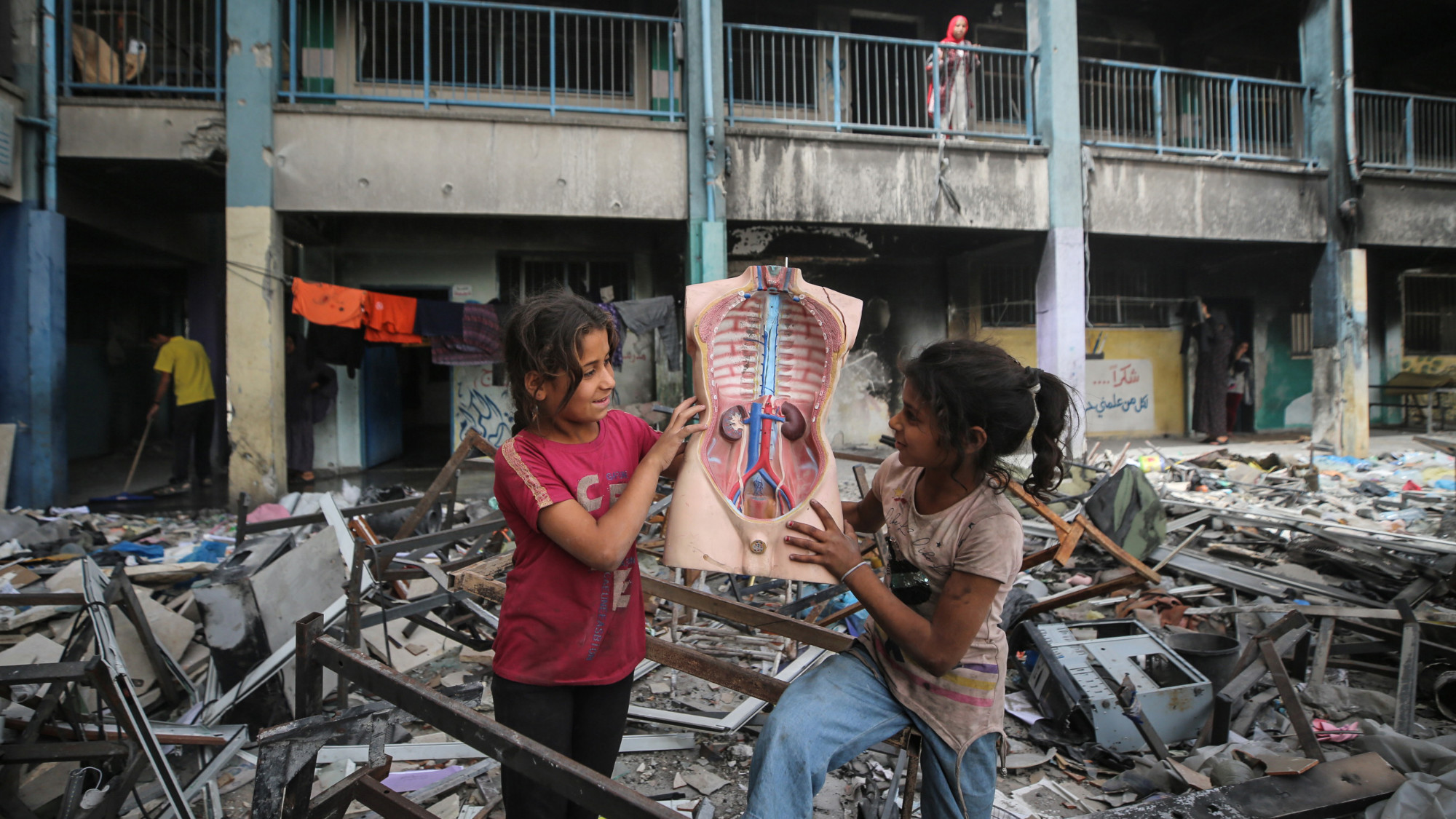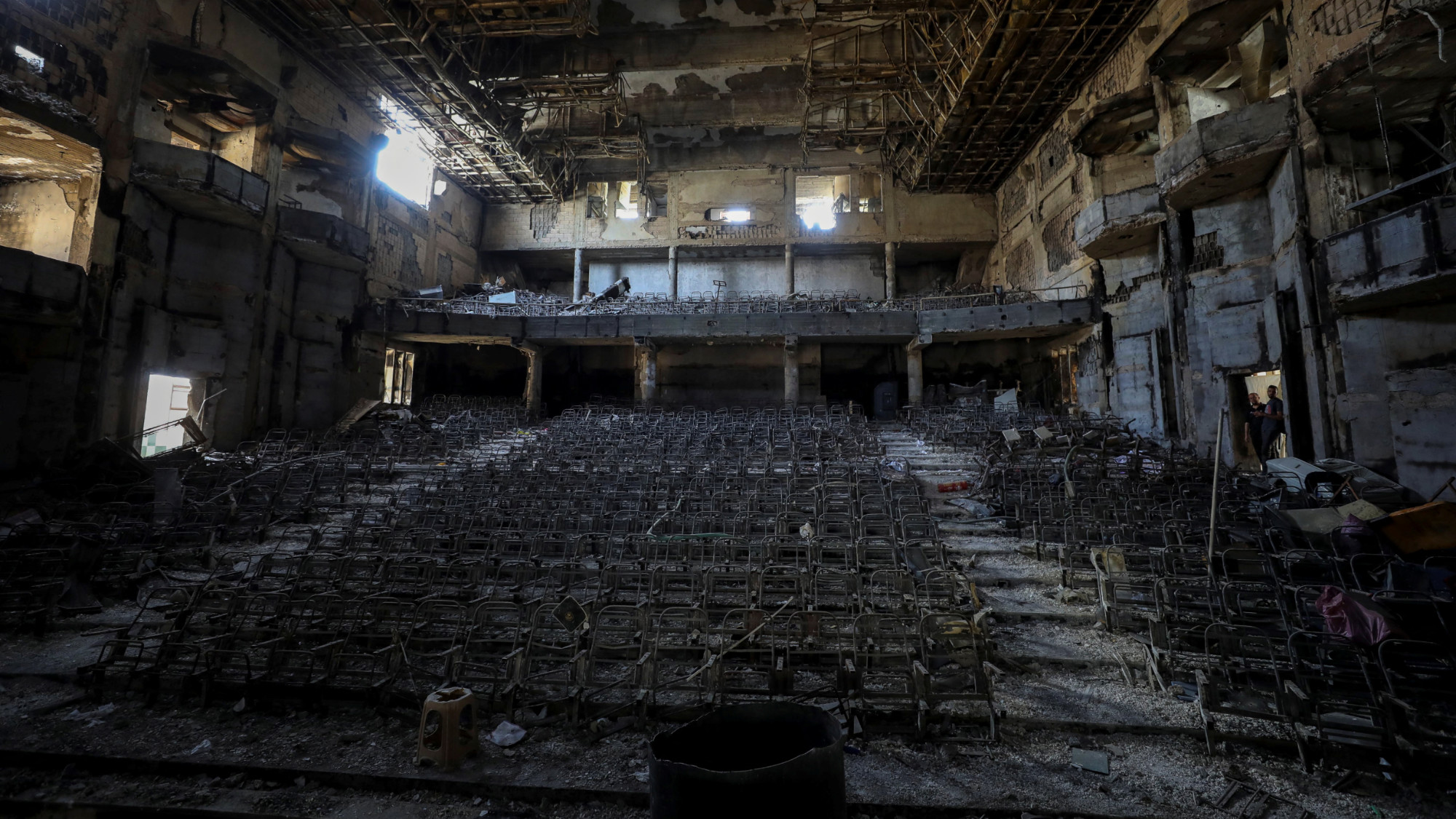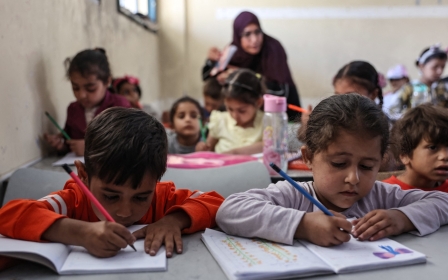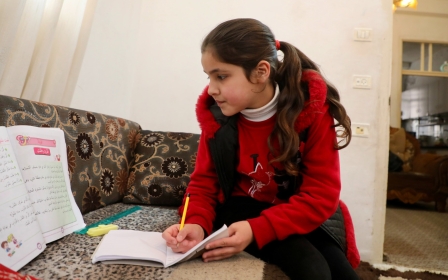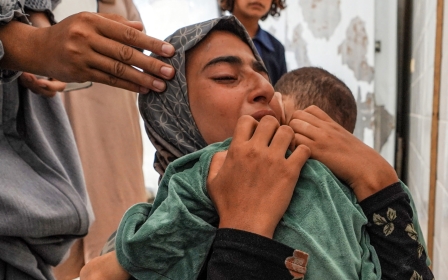War on Gaza: Students fight to keep learning amid Israeli 'scholasticide'
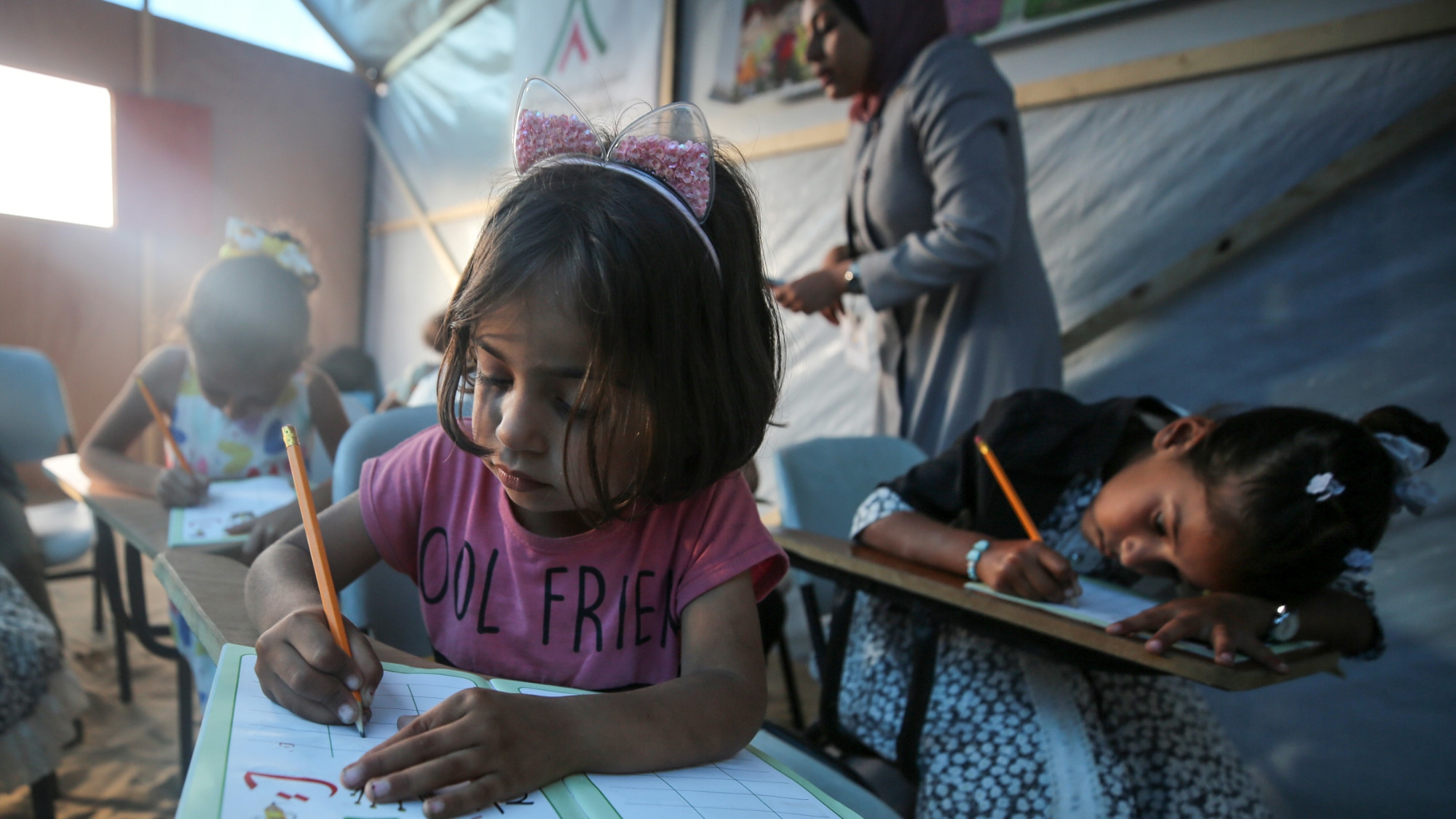
When Nour fled her home to Rafah early in Israel's continuing war on Gaza, she didn't pack her two daughters' textbooks.
But as the assault dragged on, the Palestinian mother noticed they were beginning to forget what they had learned. Worried for their future, she took matters into her own hands.
"I downloaded their school textbooks online and relied on YouTube channels that explain the Palestinian curriculum," the social media activist, who preferred to be identified by her surname, told Middle East Eye.
"I went to a nearby bookstore and printed out the necessary materials, like reading lessons or exercises requiring writing, to keep them engaged. I focused on Arabic, English and maths."
A corner in her shelter had been turned into a makeshift classroom, where she gave lessons and monthly exams to her daughters, who have been deprived of a regular education for an entire school year along with all of Gaza's pupils.
New MEE newsletter: Jerusalem Dispatch
Sign up to get the latest insights and analysis on Israel-Palestine, alongside Turkey Unpacked and other MEE newsletters
The Israeli war, now in its ninth month, has killed more than 15,000 children, many of them students.
It has also destroyed all Gaza's universities and most of its schools in what rights experts say is a deliberate policy to obliterate education in the Palestinian enclave.
'I wanted to fill their time with learning instead of dwelling on displacement or fear'
- Nour, Palestinian mother
Homeschooling wasn't easy at first, Nour said, but her children have now finished the first semester's curriculum and are on to the second one, learning three to four hours a day.
The 35-year-old mother says the classes are good for the children's education and mental health.
"During the first period of displacement, I was struggling with a bad mental health condition after my sister was martyred and my family remained in the north of Gaza," Nour told MEE.
"Then I felt that I needed to distract myself from overthinking and decided to establish a specific routine for myself and the children. I wanted to fill their time with learning instead of dwelling on displacement or fear."
'Scholasticide'
Before the war, there were 796 schools in the Gaza Strip, including 442 public schools, 70 private schools and 284 run by the United Nations agency for Palestinian refugees, Unrwa.
There were 12 universities and higher education institutions.
Gaza had one of the lowest illiteracy rates in the world, with the percentage decreasing from 13.7 percent in 1997 to 1.8 percent in 2022.
Around 700,000 children and young people were enrolled in schools and universities out of the strip's 2.2 million population.
In its ongoing bombardment, Israel has damaged or completely destroyed all universities and more than 80 percent of all schools in Gaza.
They have killed and wounded thousands of students and hundreds of teachers, including at least 100 professors.
According to UN experts, the scale of destruction to schools raises questions on whether this was an "intentional effort to comprehensively destroy the Palestinian education system".
The independent experts suggested that Israel could be engaging in "scholasticide", a term describing the systematic destruction of education. This includes actions such as the arrest, detention or killing of teachers, students and staff, as well as the deliberate destruction of educational facilities.
Even if the war ends soon, returning to school will not be easy.
Hundreds of thousands of displaced Palestinians are seeking shelter in whatever schools have remained standing. The homes of the majority of those people have either been completely lost or will take months to repair.
According to a UN report, even in the best-case scenario, where construction materials are delivered five times faster than after the 2021 attack on Gaza, rebuilding destroyed homes could take until at least 2040, but could also extend for many decades.
'I don't stop unless the shelling is close'
Faced with widespread destruction and uncertainty about the future, many like Nour are beginning small and personal initiatives to ensure learning in Gaza doesn't stop.
In a cafe in Deir al-Balah, in the central Gaza Strip, Nadia Saeed Se'da sits with her grandfather, a retired school principal, who helps her prepare for the final exam in educational sciences at al-Quds Open University.
For months, she has frequented the cafe to download online lectures, communicate with her professors and complete exams online.
Her university, which has branches in the occupied West Bank, has facilitated students in war-torn Gaza to participate in remote classes.
The students are provided with facilities, including access to download lectures online, and the opportunity to contact West Bank-based professors via WhatsApp for further explanations at any time.
'I watch my lectures while the Israeli army is bombing the area where I am taking shelter'
- Nadia Se'da, Palestinian student
Other universities across the devastated enclave are poised to take similar measures soon.
"I don't have electricity or internet access in my shelter, so I come here every couple of days to download the lectures and then return to my shelter to watch them during the day," Se'da, who is internally displaced from Gaza City, said.
"When I have questions, I contact my professors and they call me directly to explain what I don't understand."
The 22-year-old student, who is in her senior year, says the challenges to keep up with her peers in the West Bank are "immense, but that's how we build a future".
"I am determined to finish my final year despite all the difficulties we are facing. Most of the time, I watch my lectures while the Israeli army is bombing the area where I am taking shelter.
"I don't usually stop unless the shelling is very close."
Delayed graduations
Across Palestine, exams for senior high-school students, known as Tawjihi, are widely anticipated both by pupils and their families. The scores determine admission to university, offering a source of pride for many parents.
In 2023, nearly half of the students who topped Palestine's Tawjihi examinations were from the Gaza Strip.
They included Al-Shaima Akram Saidam, Palestine's top student, who was killed in an Israeli air strike along with several members of her family in Nuseirat refugee camp in October at the onset of the war.
As high-school students this year in the West Bank prepare for the Tawjihi exams in late June, around 40,000 students from the Gaza Strip will not join them for the first time in decades, delaying their university entry by at least a year.
Graduation delays are also a worry for many university students, who have seen their lecture halls bombed and professors killed over nine months.
Ahmed Saqallah was supposed to sit for his final exams in May, marking the culmination of four years of studying for his degree at Gaza's al-Azhar University.
However, the graduation of the interior design student has been indefinitely postponed following the bombing and demolition of his university by the Israeli military last month.
Breaking: The Israeli army demolishes buildings at al-Azhar University in central Gaza, destroying all higher education institutions in Gaza.
— Ramy Abdu| رامي عبده (@RamAbdu) May 2, 2024
This scene should be a guiding message to American university students.@EuroMedHR prior press release: https://t.co/1i5JXFYrrX pic.twitter.com/5KFeAqnPkv
"I was eagerly waiting for my graduation ceremony, looking forward to the moment when I would finally graduate and start my career," Saqallah told MEE.
"But today, I am more deeply saddened by the demolition of my university and the killing of my colleagues and professors," he said.
Seeing the video of his university being demolished has impacted him more than the destruction of his home, he said, because "they are not just devastating our homeland but also our future and every chance for us to improve our lives".
War will eventually end, he said, but what comes after will be just as challenging.
'They are not just devastating our homeland but also our future'
- Ahmed Saqallah, Palestinian student
"How long would it take for the universities to be rebuilt again? How many of their professors and administrative staff will still be alive?"
But for now, the dream of graduation has become a secondary concern for Saqallah.
Originally from Gaza City, he had taken shelter in Rafah with his extended family for months. Israeli forces invaded the city in early May, forcing nearly one million internally displaced people like him into another round of displacement.
"In [previous] weeks, during the relatively safer days, I could steal an hour or two a day and try to educate myself online, reach out to universities abroad to explore opportunities to continue my education, and check on my professors and colleagues," the 21-year-old said.
"Now, my sole focus is on staying safe and alive."
Middle East Eye delivers independent and unrivalled coverage and analysis of the Middle East, North Africa and beyond. To learn more about republishing this content and the associated fees, please fill out this form. More about MEE can be found here.


